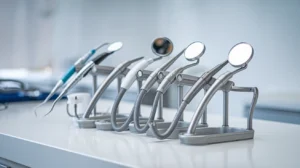
How to Choose the Best Dental Mouth Mirror for Oral Care
Picking the right dental mouth mirror might seem like a small task, but it’s actually pretty important for keeping your teeth and gums healthy. With so many options out there,
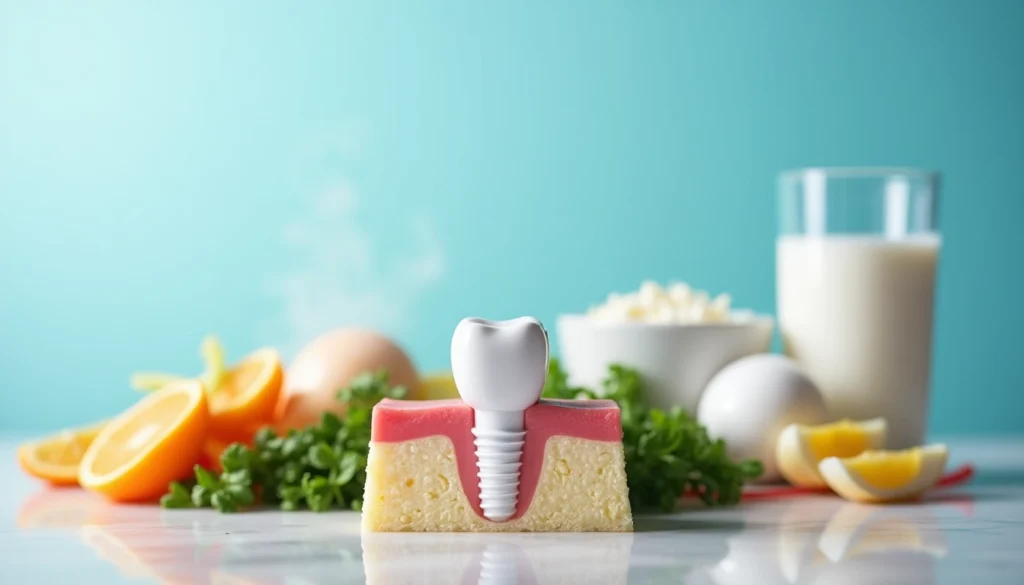
Many dental implant patients ask me: “Why can’t I have dairy after my procedure?” This isn’t just another random dietary restriction – science backs it up.
My patients frequently ask if avoiding dairy is essential or just an old wives’ tale. The connection between dairy products and dental implant recovery runs deeper than most people realize.
Here are some common beliefs we need to address:
Yes, it is true that dairy products benefit overall dental health, but the post-implant period stands apart. Dental implant recovery differs from regular healing – it’s a precise process where every detail counts.
People often mix up long-term dental health with post-surgical care. As your dental care partner, I should point out that calcium-rich dairy products help maintain strong teeth and bones. However, the time right after implant surgery needs special attention.
Picture your dental implant site as a construction zone. You wouldn’t disturb fresh concrete while it sets. The same applies to your implant as it integrates with your bone.
Patients often ask about timing – when can they start enjoying dairy products again? You might question if this restriction deserves strict adherence. The scientific reasoning behind this guideline will help you make better choices about your recovery.
The next sections explain why dairy products might affect your implant’s success. I’ll show you better alternatives that support your healing. Let’s make sure your dental implant recovery goes smoothly.
Let me talk about a significant concern that follows dental implant surgery – the risk of infection. We need to look closely at how dairy products might affect post-surgical infections.
Your mouth works like a delicate ecosystem. The environment becomes especially sensitive after implant surgery. It also creates perfect conditions that bacteria love to grow in, something we must avoid while you heal.
Dairy products can raise your infection risk for several reasons. These products leave a thick, sticky coating in your mouth. Natural sugars in dairy serve as food for bacteria. The proteins can reduce how well antibacterial medications work. Their creamy texture might disturb the surgical site.
The initial 48-72 hours after implant surgery play a vital role in proper healing. Your body starts the complex process of connecting the implant to your jawbone. Adding dairy products during this sensitive time could interfere with your body’s natural healing process.
You might ask about yogurt because it contains probiotics. Notwithstanding that, even good bacteria can upset the delicate balance in your mouth right after surgery. My patients learn to see their implant site as a fresh wound – because that’s exactly what it is.
Usually harmless bacteria in dairy products become problematic near a surgical site. These bacteria, combined with dairy sugars (lactose), create conditions that might risk your implant’s success.
To cite an instance, see how your mouth’s temperature and moisture levels make it perfect for bacteria to grow. Adding dairy products here works like extra fuel for unwanted bacterial growth.
My patients understand that avoiding dairy isn’t just about stopping infections – it helps create perfect conditions for implant integration. Skipping dairy products temporarily seems a small trade-off to ensure proper implant healing.
Don’t call it a restriction – this is a positive step in your recovery experience. You give your body the best chance for successful implant integration by removing these risk factors quickly.
Your body and the titanium implant perform a delicate dance during the healing process after dental implant surgery. My patients better understand their dietary restrictions, especially avoiding dairy, when they learn about this recovery journey.
The sort of thing i love is the process of osseointegration – the life-blood of successful implant healing. Your jawbone grows around and bonds with your implant. Picture your body building a strong foundation that will support your new tooth.
The significant healing phases happen like this:
We noticed dairy products can disrupt this precise healing sequence. The proteins and fats in dairy create a barrier between your healing tissues and the essential nutrients they need. This is similar to building a brick wall while someone keeps spraying it with water – it just won’t set properly.
The calcium in dairy isn’t what your implant site needs right now. Your body needs a complex mix of nutrients and proper blood flow to support healing. Dairy products can slow down this nutrient delivery system by coating the surgical area.
Patients often ask me, “But don’t I need calcium for bone healing?” Yes, it is important to bone health, but consuming dairy right after implant surgery isn’t the best approach. The optimal environment for osseointegration becomes our focus instead.
Your dental implant site works like a construction zone where timing matters most. Dairy can increase infection risk and disrupt the delicate process of bone-to-implant bonding. The thick, sticky nature of dairy products interferes with the careful choreography of cellular activity at the implant site.
This restriction won’t last forever. You can add dairy products back into your diet once proper healing occurs. Right now, we should focus on other nutrient-rich foods that support healing without disrupting the process.
Let’s talk about foods that will help your implant heal well. Good nutrition is a vital part of making sure your dental implant merges with your jawbone.
Your body needs certain nutrients to build and repair tissues after implant surgery. We focused mostly on protein as your best friend during recovery. You should eat more protein than usual to help your body heal faster.
These nutrient-rich foods will help you recover better:
Vitamin C is vital to form collagen that supports your gum health and tissue repair. Zinc substantially helps in healing and protecting against infections.
These preparation techniques will give you maximum nutrition:
Staying hydrated is key to your recovery. Make sure to drink at least eight glasses of water daily to flush out toxins and support cell function.
Protein Power Tip: After the first week, you can slowly add softer meats to your diet. Try adding finely chopped fish or ground chicken to your meals.
Omega-3 fatty acids play a special role in your recovery diet. These nutrients help control inflammation around your implant site. To name just one example, see how soft-cooked fatty fish in your meals can substantially boost your healing process.
Your body needs calcium and vitamin D to work together for good bone health. Since we’re avoiding dairy, you can get these nutrients from fortified non-dairy alternatives and sunshine exposure.
Note that you should eat these healing foods at room temperature or slightly warm – never hot. This protects your surgical site while helping you get the most nutrients from your meals.
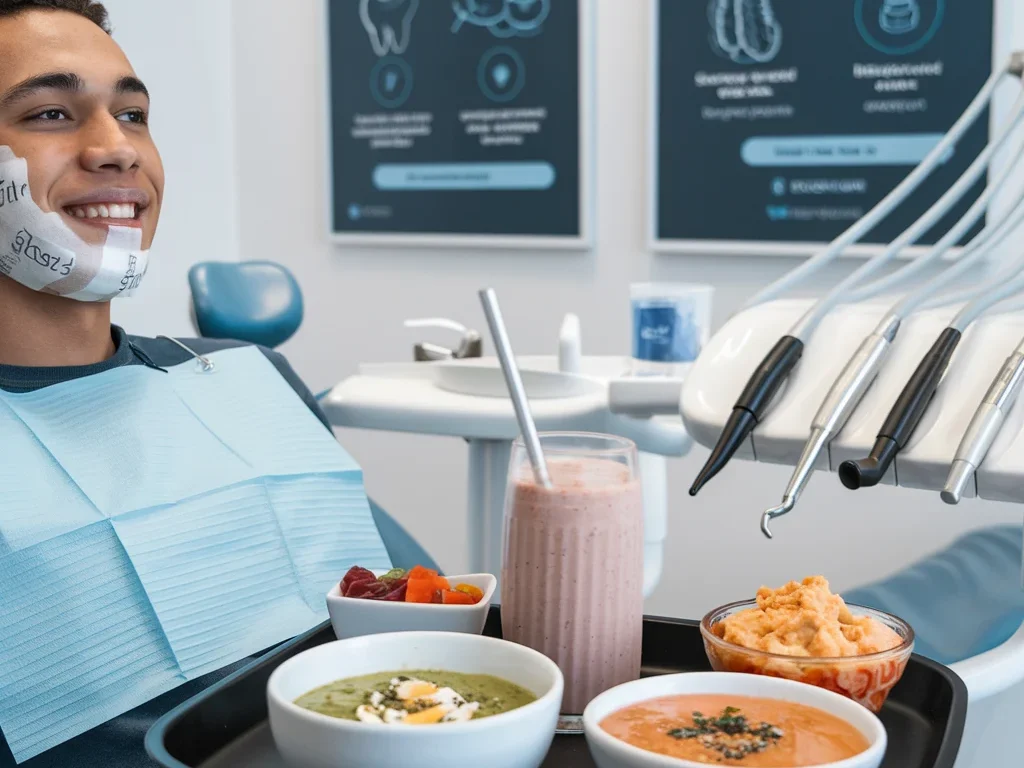
Your dental implant investment needs protection through proper food choices. Here’s a complete guide to help you manage your post-surgery diet with confidence.
Several food categories could put your implant’s success at risk:
The first 24 hours matter most. My patients receive these instructions for the immediate post-surgery period:
Pizza crust and other seemingly harmless foods can pose risks. Food that makes noise when you chew should be avoided during recovery.
Your food choices depend on the healing timeline. You’ll need to be careful with certain foods during the osseointegration period (3-6 months). This isn’t about permanent restrictions – your implant just needs the best chance to succeed.
Tough proteins like steak raise a common question. The answer makes sense: more jaw movement during chewing increases the risk to your healing implant site. Eggs, fish, and ground meats offer easier-to-chew protein alternatives.
Dark beverages need special attention. Implants work like natural teeth but stain more easily. Your bright smile stays longer when you limit coffee, tea, and red wine.
My patients learn this simple “S” principle:
Your implant’s success depends by a lot on following these dietary guidelines. Picture your mouth as a construction site – you wouldn’t disturb a setting foundation. Your implant needs time to blend properly, so watch what you eat and drink.
Note that these restrictions won’t last forever. Your regular diet returns gradually as healing progresses. Success comes from patience and following your dentist’s timeline for adding different foods back.
Your experience returning to normal eating after dental implant surgery follows a careful, step-by-step progression. As your dental care provider, I want to share how we’ll help you get back to enjoying all your favorite foods.
Your comfort level serves as the biggest indicator for dietary changes. These positive signs tell me it’s time to advance your diet:
Regular eating returns in stages. Here’s the progression I recommend to my patients:
The osseointegration process (implant-to-bone fusion) continues for 3-6 months after surgery. My patients need to stay mindful of their eating habits during this time, even as they expand their food choices.
Each person’s healing experience differs. Some patients progress faster, while others need more time. This makes it vital to listen to your body and follow your dental team’s tailored guidance.
When Can You Eat Normally Again?
You can return to normal eating after your dentist confirms full jawbone recovery and fusion. This means no dietary restrictions and freedom to enjoy any food you like.
The non-implant side of your mouth can handle normal chewing sooner. I suggest using that side for chewing during the first few months until complete healing occurs.
Your long-term outlook remains excellent. Fully healed dental implants work just like natural teeth. A balanced diet becomes possible again with all food groups – lean proteins, fruits, vegetables, whole grains, and yes, even dairy products.
A Word About Dairy Reintroduction
Many patients ask about dairy products. You can usually resume consuming dairy after the original healing period, about 2-3 weeks post-surgery. Your dental team should give you clear approval before making this dietary change.
Note that good oral hygiene becomes more significant as you expand your diet. This gradual return to normal eating marks the final phase of your implant experience and sets you up for success with your new smile.
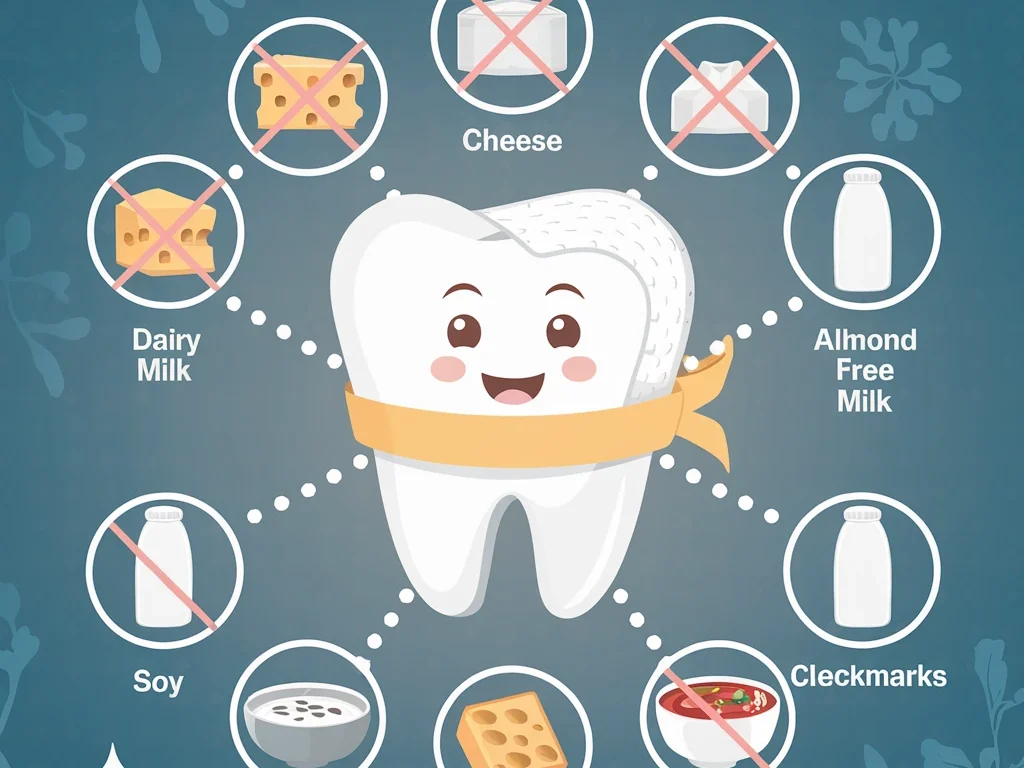
You’ll feel more motivated to follow dietary guidelines when you understand how avoiding dairy helps after dental implant surgery. Let me share why this short-term restriction benefits your recovery trip so much.
Dairy products can trigger oral tissue inflammation because of a protein called casein. Your implant heals better when you avoid dairy because it creates the perfect environment for recovery.
My patients who skip dairy see these key advantages:
A clean surgical site stays cleaner without dairy. Dairy products leave thick, sticky residue around your implant that could help harmful bacteria grow. These products become breeding grounds for bacteria, especially at room temperature.
Skipping dairy helps your post-surgical medications work better. Dairy products interfere with antibiotic absorption. Your prescribed medications work at their best levels when you temporarily remove dairy from your diet.
The proteins in dairy, especially casein, need special attention. These compounds trigger inflammation in your oral tissues. Your body responds naturally to irritation through inflammation – something we want to minimize during healing. Your body focuses more energy on healing instead of managing inflammation when you avoid dairy.
The sort of thing I love about dairy avoidance is how it prevents complications. Dairy fats can trigger inflammation around your implant site. Thick dairy products might also trap food particles where bacteria multiply.
My patients learn that avoiding dairy creates the best conditions for healing rather than just preventing problems. Dairy compounds interfere with blood clotting – a vital part of your original healing phase. Your body’s natural healing works better without dairy.
Low-fat or non-fat dairy alternatives can provide essential nutrients while minimizing potential risks. This temporary restriction becomes easier when you focus on the long-term success of your implant.
This simple dietary change affects your recovery trip dramatically. Your mouth stays dairy-free during the original healing period and actively supports osseointegration – that vital phase where your implant bonds with your jawbone.
Smart recovery choices depend on knowing why dairy products affect dental implant surgery. My years of experience show that patients who stick to these dietary guidelines heal better.
Avoiding dairy products is just one part of your recovery journey. The right conditions for implant success come from your attention to post-surgical care, good nutrition, and following dietary limits. These temporary restrictions might seem tough at first, but they’re quite manageable.
My patients often tell me their worries about dairy restrictions disappear once they grasp the science behind it. You’ll get back to enjoying all your favorite foods – dairy included – after proper healing. Success comes from staying patient during those vital first weeks of recovery.
Your choices in these early stages shape your implant’s success. This period lays a strong foundation for your new smile. These guidelines aren’t just restrictions – they’re steps toward your goal of a beautiful, fully working implant.
A strong, stable implant that works like your natural teeth will reward your effort. A short time without dairy is worth the lifetime of confident smiles ahead.
It’s generally recommended to avoid dairy products for the first few days following dental implant surgery. After the initial healing period, usually within 2-3 weeks, you can gradually reintroduce dairy into your diet. However, always consult with your dentist for personalized advice based on your specific healing progress.
Yes, eggs are an excellent food choice after dental implant surgery. They are soft, easy to chew, and rich in protein, which is essential for healing. Scrambled eggs, in particular, can be a nutritious and comfortable option during your recovery period.
Avoiding dairy after dental implant surgery can reduce the risk of tissue irritation, enhance the effectiveness of prescribed antibiotics, and minimize the chances of post-surgical complications. It also helps maintain a clean surgical site and supports faster overall healing by preventing potential inflammation caused by dairy proteins.
During dental implant recovery, you can focus on soft, nutrient-rich foods such as mashed sweet potatoes, steamed leafy greens, soft fruits like bananas and peaches, and protein-rich options like fish or finely chopped chicken. These foods provide essential nutrients without interfering with the healing process.
The duration of dietary restrictions varies, but generally, you should follow a soft food diet for the first few weeks after surgery. Gradually, you can introduce firmer foods over the next 2-3 months. Complete return to a normal diet typically occurs after your dentist confirms full jawbone recovery and fusion, which can take 3-6 months. Always follow your dentist’s specific guidelines for your case.

Picking the right dental mouth mirror might seem like a small task, but it’s actually pretty important for keeping your teeth and gums healthy. With so many options out there,
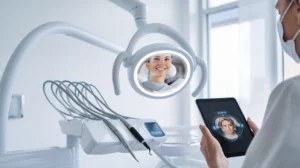
Dental mirrors have come a long way. From simple reflective tools to sophisticated gadgets, they play a key role in modern dentistry. With constant innovation in dental mirrors, these aren’t
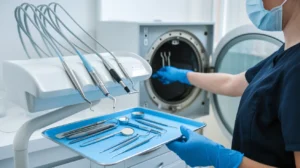
Hey there, dental pros! Today, we’re diving into something super important but often overlooked—how to properly mouth mirror sterilization. If you’re in the dental field, you know these little tools
At The Surgical Kit, we are committed to providing healthcare professionals with the finest tools to ensure precision and safety in every procedure.